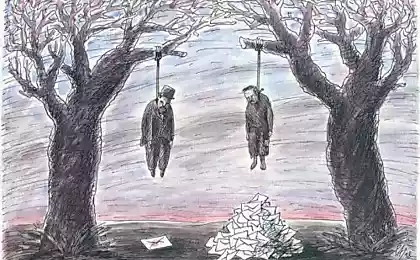488
I survived suicide. And I have something to tell You
Psychotherapist Katie Hurley tells us about his experience of depression and suicide attempt. 
I survived suicide.
I don't really want a long time to explain how I came to the point when I felt life I don't need. My healing was a long process, drawn a veil of grief. There were moments when I thought I was completely alone in this world of indifferent people. And there were moments when I felt lost and confused. The problem with suicide is that none of the people nearby don't know what you have to say. No one knows how to respond to your trouble. People try to smile and distract you from dealing with yourself. But they never say what you need. People who have gone through it and survived, it seems that nobody will help them, and go through hell in their head they have on their own.
In the first days, weeks, months and even years after my father's death I experienced an endless series of different emotions. I've been breeding themselves to enormous fatigue in the pool. To not have the strength to think about his tragedy. I was afraid to answer the phone. I blamed myself that it was my fault for his death. Sometimes, I cried. Sometimes it sat motionless for hours on the beach. Sometimes silently scolded herself for the paralysis of the will. Sometimes tried to negotiate with God or someone else responsible for what is happening in the sky. I begged the Lord to return it to us. Sometimes I was angry. And asked myself: "Why him and not someone else?".
Yes, I definitely experienced the whole gamut of emotions before he accepted the loss. And all this time I suffered, it was people talking that depression and suicide is a special form of selfishness. What we have to live not for myself but for somebody, for somebody. But I knew that suicide is anything, but only not about selfishness. People who committed suicide, you can blame anything, but not that they have acted irresponsibly.
Suicide is a decision made out of desperation, hopelessness, isolation and loneliness. The black hole of clinical depression actually is all-consuming. At first you feel bad, and then you feel like a burden. You think that there is no way out. You feel trapped, that nobody will help you out. The feeling of loneliness is something that people considering suicide seriously, test first.
People who say that suicide is an act of selfishness, always refer to those who survived. Like, they realized that he was trying to leave children without a father, wives without husbands, parents without children. Members of the family make any suicide feel guilty. They make him believe that irresponsible type. Than making it worse. That is why we so often deal with repeated suicide attempts.
In fact, anyone who decided to commit suicide, it is unfortunate relatives. But these people are taking this step because I do not see any meaning in their existence, nor the way that will help them with the meaning to find. Nobody is going to impose on the hands until, until you try everything, as it seems, the options of "treatment". It may sound paradoxical, but nobody wants to die. Even suicides.
People often confuse the recurring sense of despair and clinical depression. Are two different things. If you have never thought seriously about suicide, you will never understand the person who is already done. Or tried to do.
The story of Robin Williams because struck the whole world that nobody thought that smiling in public, people in reality feels absolutely miserable. In fact, it turns out that smiling people can just wear a mask of well-being, but in fact every day I struggle with, others do not even suspect. Some of them will commit suicide. Some will try to do it. And some will cling to life with all his strength. For months or years. And then always ends the same way.
The study history of clinical depression confirms the fact that this disease is extremely difficult to treat. The only way to save the person who suffers from it is to detect the disease at an early stage and to take immediate action to remedy the situation.
Here are some facts about people with suicidal tendencies.
1. They talk about suicide. According to statistics, 50-75% of people trying to commit suicide, I say out loud, but as in the joke that can kill yourself. Listen carefully to these signals. Understand what actually the problem, support the person, show him sympathy. For a long time and then ask as his mood is, and how to pick it up.
2. Call people who are depressed. If they don't open the door for you and don't want to drink, to walk or to party, long wait at the door and beg to talk. Make an effort. Do not think that to you this problem will never come.
Friendship is not sprees. Friendship is the ability to listen and be present in difficult conversations.
3. Listen to the language people who have a bad mood. If it has the word "depression", "despair" and "meaning of life" meet as often as the word "Apple" or "chewing gum" — it is a signal that everything is bad.
4. Don't be afraid to remind yourself again and again. Don't be afraid to repeat the same words of support for months in a row. Other way.
300 thousand people commit suicide in the United States each year. Another 750 thousand attempt such attempts. Time to start talking about depression seriously. And be prepared for the fact that the trouble can knock on the door and in your house. published
Author: Konstantin Shiyan
P. S. And remember, only by changing their consumption — together we change the world! ©
Source: lifter.com.ua/YA-peregila-samoubiystvo-I-mne-est-chto-vam-skazat#42337

I survived suicide.
I don't really want a long time to explain how I came to the point when I felt life I don't need. My healing was a long process, drawn a veil of grief. There were moments when I thought I was completely alone in this world of indifferent people. And there were moments when I felt lost and confused. The problem with suicide is that none of the people nearby don't know what you have to say. No one knows how to respond to your trouble. People try to smile and distract you from dealing with yourself. But they never say what you need. People who have gone through it and survived, it seems that nobody will help them, and go through hell in their head they have on their own.
In the first days, weeks, months and even years after my father's death I experienced an endless series of different emotions. I've been breeding themselves to enormous fatigue in the pool. To not have the strength to think about his tragedy. I was afraid to answer the phone. I blamed myself that it was my fault for his death. Sometimes, I cried. Sometimes it sat motionless for hours on the beach. Sometimes silently scolded herself for the paralysis of the will. Sometimes tried to negotiate with God or someone else responsible for what is happening in the sky. I begged the Lord to return it to us. Sometimes I was angry. And asked myself: "Why him and not someone else?".
Yes, I definitely experienced the whole gamut of emotions before he accepted the loss. And all this time I suffered, it was people talking that depression and suicide is a special form of selfishness. What we have to live not for myself but for somebody, for somebody. But I knew that suicide is anything, but only not about selfishness. People who committed suicide, you can blame anything, but not that they have acted irresponsibly.
Suicide is a decision made out of desperation, hopelessness, isolation and loneliness. The black hole of clinical depression actually is all-consuming. At first you feel bad, and then you feel like a burden. You think that there is no way out. You feel trapped, that nobody will help you out. The feeling of loneliness is something that people considering suicide seriously, test first.
People who say that suicide is an act of selfishness, always refer to those who survived. Like, they realized that he was trying to leave children without a father, wives without husbands, parents without children. Members of the family make any suicide feel guilty. They make him believe that irresponsible type. Than making it worse. That is why we so often deal with repeated suicide attempts.
In fact, anyone who decided to commit suicide, it is unfortunate relatives. But these people are taking this step because I do not see any meaning in their existence, nor the way that will help them with the meaning to find. Nobody is going to impose on the hands until, until you try everything, as it seems, the options of "treatment". It may sound paradoxical, but nobody wants to die. Even suicides.
People often confuse the recurring sense of despair and clinical depression. Are two different things. If you have never thought seriously about suicide, you will never understand the person who is already done. Or tried to do.
The story of Robin Williams because struck the whole world that nobody thought that smiling in public, people in reality feels absolutely miserable. In fact, it turns out that smiling people can just wear a mask of well-being, but in fact every day I struggle with, others do not even suspect. Some of them will commit suicide. Some will try to do it. And some will cling to life with all his strength. For months or years. And then always ends the same way.
The study history of clinical depression confirms the fact that this disease is extremely difficult to treat. The only way to save the person who suffers from it is to detect the disease at an early stage and to take immediate action to remedy the situation.
Here are some facts about people with suicidal tendencies.
1. They talk about suicide. According to statistics, 50-75% of people trying to commit suicide, I say out loud, but as in the joke that can kill yourself. Listen carefully to these signals. Understand what actually the problem, support the person, show him sympathy. For a long time and then ask as his mood is, and how to pick it up.
2. Call people who are depressed. If they don't open the door for you and don't want to drink, to walk or to party, long wait at the door and beg to talk. Make an effort. Do not think that to you this problem will never come.
Friendship is not sprees. Friendship is the ability to listen and be present in difficult conversations.
3. Listen to the language people who have a bad mood. If it has the word "depression", "despair" and "meaning of life" meet as often as the word "Apple" or "chewing gum" — it is a signal that everything is bad.
4. Don't be afraid to remind yourself again and again. Don't be afraid to repeat the same words of support for months in a row. Other way.
300 thousand people commit suicide in the United States each year. Another 750 thousand attempt such attempts. Time to start talking about depression seriously. And be prepared for the fact that the trouble can knock on the door and in your house. published
Author: Konstantin Shiyan
P. S. And remember, only by changing their consumption — together we change the world! ©
Source: lifter.com.ua/YA-peregila-samoubiystvo-I-mne-est-chto-vam-skazat#42337























